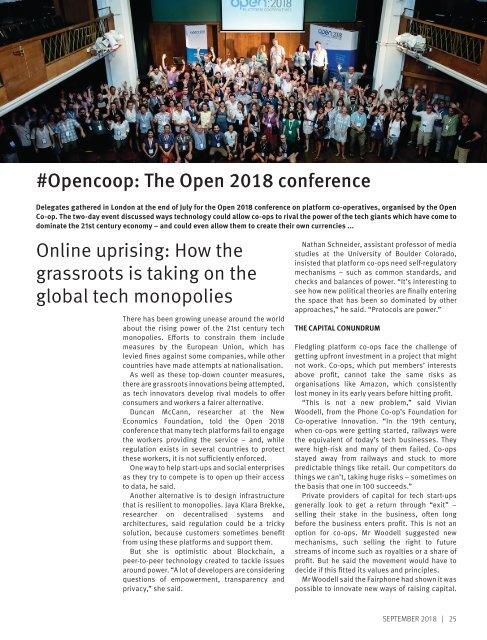SEPTEMBER 2018
The September edition of Co-op News looks at how co-ops cab maintain co-operative values and principles while operating in competitive markets and how this can be a challenge for large co-ops. We examine current research into what influences a co-op’s take on the traditional values of self-help, self-responsibility, democracy, equality, equity and solidarity.
The September edition of Co-op News looks at how co-ops cab maintain co-operative values and principles while operating in competitive markets and how this can be a challenge for large co-ops. We examine current research into what influences a co-op’s take on the traditional values of self-help, self-responsibility, democracy, equality, equity and solidarity.
You also want an ePaper? Increase the reach of your titles
YUMPU automatically turns print PDFs into web optimized ePapers that Google loves.
#Opencoop: The Open <strong>2018</strong> conference<br />
Delegates gathered in London at the end of July for the Open <strong>2018</strong> conference on platform co-operatives, organised by the Open<br />
Co-op. The two-day event discussed ways technology could allow co-ops to rival the power of the tech giants which have come to<br />
dominate the 21st century economy – and could even allow them to create their own currencies ...<br />
Online uprising: How the<br />
grassroots is taking on the<br />
global tech monopolies<br />
There has been growing unease around the world<br />
about the rising power of the 21st century tech<br />
monopolies. Efforts to constrain them include<br />
measures by the European Union, which has<br />
levied fines against some companies, while other<br />
countries have made attempts at nationalisation.<br />
As well as these top-down counter measures,<br />
there are grassroots innovations being attempted,<br />
as tech innovators develop rival models to offer<br />
consumers and workers a fairer alternative.<br />
Duncan McCann, researcher at the New<br />
Economics Foundation, told the Open <strong>2018</strong><br />
conference that many tech platforms fail to engage<br />
the workers providing the service – and, while<br />
regulation exists in several countries to protect<br />
these workers, it is not sufficiently enforced.<br />
One way to help start-ups and social enterprises<br />
as they try to compete is to open up their access<br />
to data, he said.<br />
Another alternative is to design infrastructure<br />
that is resilient to monopolies. Jaya Klara Brekke,<br />
researcher on decentralised systems and<br />
architectures, said regulation could be a tricky<br />
solution, because customers sometimes benefit<br />
from using these platforms and support them.<br />
But she is optimistic about Blockchain, a<br />
peer-to-peer technology created to tackle issues<br />
around power. “A lot of developers are considering<br />
questions of empowerment, transparency and<br />
privacy,” she said.<br />
Nathan Schneider, assistant professor of media<br />
studies at the University of Boulder Colorado,<br />
insisted that platform co-ops need self-regulatory<br />
mechanisms – such as common standards, and<br />
checks and balances of power. “It’s interesting to<br />
see how new political theories are finally entering<br />
the space that has been so dominated by other<br />
approaches,” he said. “Protocols are power.”<br />
THE CAPITAL CONUNDRUM<br />
Fledgling platform co-ops face the challenge of<br />
getting upfront investment in a project that might<br />
not work. Co-ops, which put members’ interests<br />
above profit, cannot take the same risks as<br />
organisations like Amazon, which consistently<br />
lost money in its early years before hitting profit.<br />
“This is not a new problem,” said Vivian<br />
Woodell, from the Phone Co-op’s Foundation for<br />
Co-operative Innovation. “In the 19th century,<br />
when co-ops were getting started, railways were<br />
the equivalent of today’s tech businesses. They<br />
were high-risk and many of them failed. Co-ops<br />
stayed away from railways and stuck to more<br />
predictable things like retail. Our competitors do<br />
things we can’t, taking huge risks – sometimes on<br />
the basis that one in 100 succeeds.”<br />
Private providers of capital for tech start-ups<br />
generally look to get a return through “exit” –<br />
selling their stake in the business, often long<br />
before the business enters profit. This is not an<br />
option for co-ops. Mr Woodell suggested new<br />
mechanisms, such selling the right to future<br />
streams of income such as royalties or a share of<br />
profit. But he said the movement would have to<br />
decide if this fitted its values and principles.<br />
Mr Woodell said the Fairphone had shown it was<br />
possible to innovate new ways of raising capital.<br />
<strong>SEPTEMBER</strong> <strong>2018</strong> | 25


















